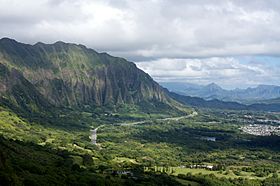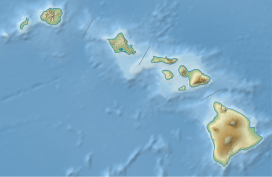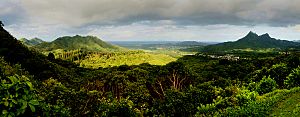Nuʻuanu Pali facts for kids
Quick facts for kids Nuʻuanu Pali |
|
|---|---|

Looking towards the northern Koʻolau Range from the Nuʻuanu Pali overlook
|
|
| Elevation | 1,168 ft (356 m) |
| Traversed by | |
| Location | |
| Coordinates | 21°22′01″N 157°47′36″W / 21.3668482°N 157.7933264°W |
| Topo map | USGS Honolulu |
The Nuʻuanu Pali is a famous cliffside area on the island of Oʻahu, Hawaii. The word pali means 'cliff' in the Hawaiian language. It's part of the Koʻolau mountains and offers amazing views of Oʻahu's northeast coast.
The main road, called the Pali Highway (Hawaii State Highway 61), goes through tunnels built right into the cliff. These tunnels connect Kailua and Kāneʻohe with downtown Honolulu.
Near the Pali, you'll find the Nuʻuanu Freshwater Fish Refuge and the Nuʻuanu Reservoir. These areas are managed by the Hawaiʻi Department of Land and Natural Resources.
The Nuʻuanu Pali State Wayside is a special lookout point above the tunnels. From here, you can see Kāneʻohe town, Kāneʻohe Bay, and Kailua. It's also known for very strong winds that blow through the pass. The Nuʻuanu Pali Tunnels were built in 1958. Before the tunnels, people used the Old Pali Road, which is now a popular hiking trail.
Contents
The History of Nuʻuanu Pali
The Nuʻuanu Pali has always been an important pathway. It's a lower part of the Koʻolau mountain range. This made it a key connection between the dry (leeward) side of the mountains, like Honolulu, and the wet (windward) side, like Kailua and Kāneʻohe. People have lived in the Nuʻuanu Valley for over a thousand years because of this easy route.
The Battle of Nuʻuanu
The Nuʻuanu Pali was the site of a very important and fierce battle in Hawaiian history. This was the Battle of Nuʻuanu. In 1795, Kamehameha I sailed from his home island of Hawaiʻi. He had an army of 10,000 warriors with him.
After taking over the islands of Maui and Molokaʻi, Kamehameha I moved on to Oʻahu. The main battle for Oʻahu happened in Nuʻuanu Valley. The Oʻahu defenders, led by Chief Kalanikūpule, were pushed back into the valley. They became trapped above the steep cliff.
Kamehameha's warriors forced Kalanikupule's men off the cliff. About 400 warriors died during this battle. After Kamehameha I won, he united all the Hawaiian Islands under his rule.
Building Roads Through the Pali
In 1845, the first road was built over the Nuʻuanu Pali. This road connected Windward Oʻahu with Honolulu. As this road was being improved in 1898, workers found 800 human skulls. These were believed to be the remains of the warriors who fell from the cliff during the battle.
This old road was later replaced by the Pali Highway and the Nuʻuanu Pali Tunnels. The tunnels opened in 1959 and are the main route used today.
Nuʻuanu Reservoir: Fishing Fun
The Nuʻuanu Reservoir is a small lake located in the valley jungle. It's found up the Nuʻuanu Pali, heading towards Kailua. This reservoir is home to different kinds of fish, like catfish and peacock bass.
If you want to fish here, you need to plan ahead! You must make an appointment about six months before your visit. This helps make sure not too many people fish at once, which protects the fish population. You also need a special fishing license and an entry fishing card. There's a limit of two fish per license, and any catfish 16 inches or larger must be kept.
Nuʻuanu Trail: An Ancient Path
The original trail to Nuʻuanu Pali started at a place called Kalanikahua. It went north of Kaumakapili Church and followed a stream. The trail then turned and went along the edge of Kamanuwai pond. It continued past taro patches (fields where a root vegetable is grown) and along the Pauoa stream. Finally, it led up to the gap at Nuʻuanu Pali. This shows how people traveled through this area long ago.
Legends and Superstitions of the Pali
The Nuʻuanu Valley and Pali are rich in Hawaiian legends and beliefs.
Guardian Stones
Two large stones in the back of Nuʻuanu Valley, named Hapuʻu and Ka-lae-hau-ola, are believed to be goddesses. They were thought to guard the path down the pali. Travelers would leave offerings like flowers or kapa (bark cloth) to have a safe journey. Parents even buried the umbilical cords of newborns under these stones to protect them from bad luck.
The Lizard Woman
According to one legend, a moʻo wahine lives at the pass. This is a lizard who can turn into a beautiful woman. She is said to trick male travelers and lead them to fall off the cliff. This legend is similar to stories about mermaids or poltergeists in other cultures.
The Pork Taboo
Hawaiian folklore also says that you should never carry pork over Nuʻuanu Pali, especially at night. This belief comes from a story about Pele, the volcano goddess, and Kamapua'a, a god who is half human and half hog. Pele would not let Kamapua'a (or pork, which represents him) cross into her part of the island. If you carry pork, it's believed she might stop your journey!
Places to Visit Near Nuʻuanu Pali
- Queen Emma's summer palace
- The summer palace of Kamehameha III
- Pali Highway
- Pali tunnels
Images for kids
 | William Lucy |
 | Charles Hayes |
 | Cleveland Robinson |






